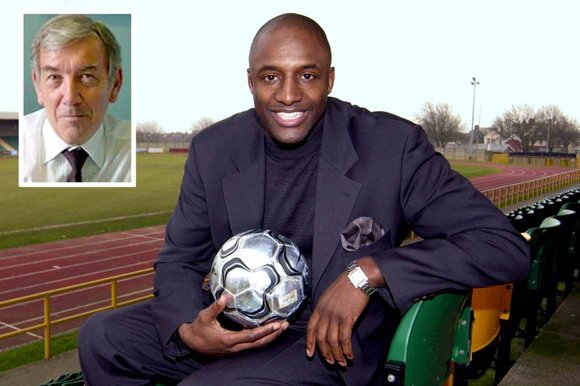Tax-haven leaks name 1000 Britons
12 May 2013
Medicine professor Robert Stockley, inset, and John Fashanu were connected to BVI companies (Sacha Miller)
A FORMER England footballer, a professor of medicine and a government trade adviser are among about 1,000 British names on a vast database of offshore entities handed to HM Revenue & Customs as it clamps down on wealth sheltered in tax havens.
Leading banks and financial institutions, including Coutts and Goldman Sachs, also appear on the list, which has been seen by The Sunday Times.
The cache of 2.5m leaked documents relate to the activities of individuals and companies in low tax jurisdictions such as Singapore, the British Virgin Islands (BVI) and Cook Islands.
It is believed to have been passed in tranches to HMRC and authorities in America and Australia by a whistleblower since 2009. The offshore data has led to a global investigation into alleged tax evasion.
Britons named in the documents include John Fashanu, the former Wimbledon striker, and Alpesh Patel, a former Financial Times columnist who advises UK Trade & Investment (UKTI). Both men deny receiving any tax advantage from offshore arrangements.
One of the more unusual names on the database, separately obtained by the International Consortium of Investigative Journalists, is Robert Stockley, professor of medicine at University Hospital Birmingham.
Documents connected Stockley, 63, a lung disease expert, to two BVI-incorporated companies, Bronko Test Ltd and International Clinical Resources (ICR), in turn linked to an account at the FirstCaribbean International Bank.
Stockley said he had volunteered information about the firms to HMRC in the course of “sorting my tax affairs”. Following negotiations he paid about £16,000 in extra tax.
The professor said ICR was a non-profit-making entity for research projects. He said he set up Bronko Test with an American partner to handle earnings — amounting to just thousands of pounds — from a lung testing chart they had invented. The company was transferred to the UK in 2008.
Stockley denied taking any dividends from the BVI company, but acknowledged that the Caribbean territory is a well-known tax haven. “Our advice from accountants was that this was quite useful,” he said. “I started to feel a bit uncomfortable, which is why we split it [the company] up and got it registered in the UK.”
He added: “HMRC knows everything. HMRC and I have come to an agreement. Everything has been declared, all dues have been paid and signed off.”
Fashanu, 50, who became a television presenter after quitting football, appears because he was named as a director of a telecommunications company set up in the BVI in 2003 by a Nigerian tycoon.
Ian Wilson, Fashanu’s manager, said the star had been enlisted in the venture only as a “figurehead” and that the company, Communication Trends Network Ltd, had folded with heavy losses. “He neither put any money in, nor did he take any money out,” said Wilson. Fashanu, who has been domiciled in Nigeria since 2006 for tax purposes, has not been contacted by HMRC.
Patel, who runs an asset management firm with offices in Mayfair, said he received a letter from HMRC about three years ago in which the authorities said they believed him to have offshore assets.
Documents from the BVI show that Patel, 41, set up a firm called AHM Investors in 2005. It was listed as “dormant” the following year.
“It never got off the ground; it never traded,” he said.
Patel, who advises UKTI on trade with India, said the mindset of many financial firms had changed since the 2008 financial crisis, before which they would have set up “tax efficient” offshoots in places such as the BVI “without thinking”. “They didn’t put a moral layer on it then,” he said.
The offshore database being trawled by HMRC also names about 200 accountants and advisers.
A source at Goldman Sachs said the firm may appear on the database because it had acted on instructions from a client to move assets into an offshore trust. The bank said it had not been contacted by HMRC.
Coutts is named in relation to its operations in the Isle of Man. It said: “We are fully committed to an open and transparent regulatory environment in all jurisdictions. We take the protection of data seriously and support our clients to appropriately declare assets.”
There is no suggestion that any of these individuals or companies have broken the law.
Additional reporting: Peter Newlands


